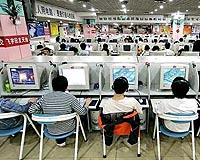 |
Washington (AFP) Feb 18, 2010 With his robust laugh, playful humor and wide-ranging intellectual curiosity, the Dalai Lama has transformed the idea of spiritual leader, becoming both global icon and hero for Tibetans. But despite befriending top leaders, hobnobbing with Hollywood celebrities and packing lecture halls around the world, the Dalai Lama has not won over one crucial audience -- China's leadership, which relentlessly vilifies him. The robed Buddhist monk met at the White House Thursday with President Barack Obama, who joined a long list of powerful figures who have welcomed him in defiance of China's anger and occasional retaliation. Despite his awkward English, the Dalai Lama shows little shyness in reaching out to strangers across cultures. After leaving his White House meeting, the 74-year-old VIP engaged waiting reporters in a childlike snowball fight. While most Tibetans come close to worshipping him, he has also endeared himself with a self-deprecating style. He is known to conclude sermons to star-struck audiences not with warnings of fire and brimstone but by saying: "If you didn't find this interesting, forget it -- no problem." "I am not a Buddhist scholar because I am a very, very lazy person," the Dalai Lama told reporters in Washington. Now one of the world's most recognizable figures, The Dalai Lama was born as Lhamo Dhondrub in a peasant family in the village of Taksar. Using ritualistic clues, monks identified him at age four as the 14th incarnation of the Dalai Lama, the supreme Buddhist leader of the Himalayan plateau. The boy was taken to the Potala Palace, the 12,210-foot (3,700-meter) high palace over Lhasa where he was to be taught the esoteria befitting Tibet's spiritual and temporal leader. He indulged in a precocious scientific curiosity, playing with a watch sent to him by US president Franklin Roosevelt and repairing cars, one of which he crashed into a palace gate. But his youthful isolation ended abruptly in 1950 when China, fresh from the communists' victory and suspicious of Western intentions, poured troops into Tibet to "liberate" it from imperialism and religion. China initially courted the Dalai Lama. But in March 1959, as rumors swirled in Lhasa of a plot to kill the revered leader, he slipped out in disguise on horseback to start more than a half century in exile in India. As he left, China crushed the abortive uprising in a crackdown that exiles say claimed 80,000 lives. India's first prime minister, Jawaharlal Nehru, offered the Dalai Lama the Himalayan hill station of Dharamshala where to this day a steady flow of refugees trek through some of the world's toughest terrain to see him. Few imagined at the time that the then 24-year-old would turn into a globetrotting spiritual leader who has fueled global interest in Buddhism and has authored or co-authored dozens of books, ranging from guides to happiness to scientific inquiries into the nature of the brain. "I don't think any of us had any appreciation of the tremendous influence this man would have," John Kenneth Knaus, a former CIA officer who helped train Tibetan insurgents, told AFP in an interview last year. The United States gave up the arms drops into Tibet in 1968 as it became clear China was fully in charge. The Dalai Lama himself showed mixed feelings on the effort and has become a steadfast pacifist, dissuading more radical elements in the Tibetan community from advocating violence against China. He has sometimes surprised even his fans with his beliefs. The celibate monk has declared himself a feminist who supports a stronger role for women and advocates the complete abolition of capital punishment. Despite his warm relationship with former US president George W. Bush, the Dalai Lama strongly opposed the war in Iraq and offered to personally mediate to avert the 2003 US invasion. In 1989, he won the Nobel Peace Prize, which paved the way for him to travel more widely around the world. Every sitting US president has met him since George H. W. Bush in 1991. Sympathizers say that it is the Dalai Lama's very perseverance and global acclaim that has so upset China. Beijing calls the Dalai Lama a "wolf in monk's clothing" and accuses him of seeking to split China, although the spiritual leader has repeatedly said he accepts Beijing's rule and is only seeking greater autonomy. Jeffrey Hopkins, an emeritus professor at the University of Virginia who was formerly the Dalai Lama's chief English interpreter, said that no matter how many fans his former boss has drawn, he was haunted by Tibetans' grievances. "One of his prime responsibilities is the welfare of the Tibetan people and I know he feels a great burden for not having succeeded more in that task," Hopkins said. "But he doesn't give up. He's not that kind of person."
Share This Article With Planet Earth
Related Links China News from SinoDaily.com
 China's 'bridge blogs' show Great Firewall's other side
China's 'bridge blogs' show Great Firewall's other sideShanghai (AFP) Feb 18, 2010 Whether it is about US arms sales to Taiwan or how the film epic "Confucius" stacks up to "Avatar", the world's first snapshot of Chinese opinion often comes from chinaSMACK.com. The website combs China's rowdy web forums, translating popular topics into English to provide a glimpse of what is on people's minds on the other side of the "Great Firewall" of government censorship. "Chinese ... read more |
|
| The content herein, unless otherwise known to be public domain, are Copyright 1995-2010 - SpaceDaily. AFP and UPI Wire Stories are copyright Agence France-Presse and United Press International. ESA Portal Reports are copyright European Space Agency. All NASA sourced material is public domain. Additional copyrights may apply in whole or part to other bona fide parties. Advertising does not imply endorsement,agreement or approval of any opinions, statements or information provided by SpaceDaily on any Web page published or hosted by SpaceDaily. Privacy Statement |